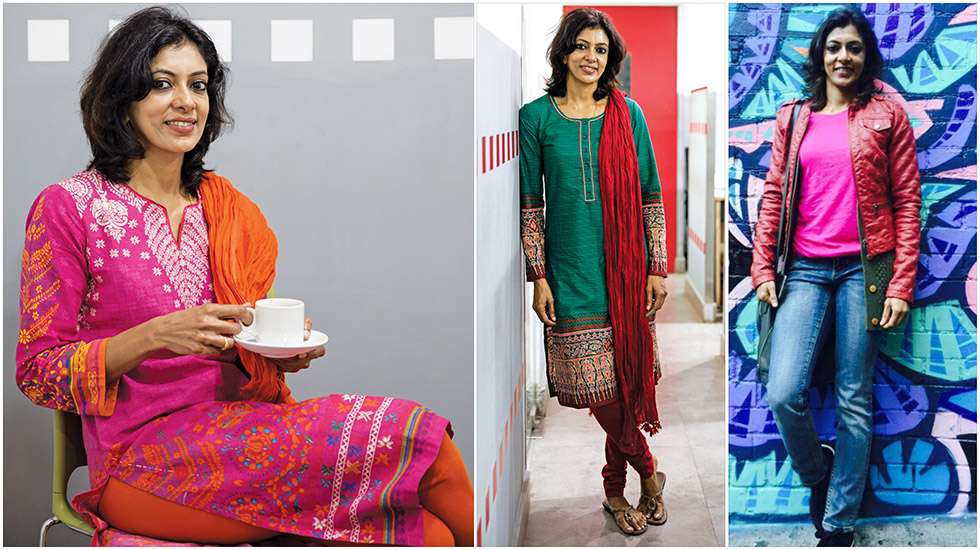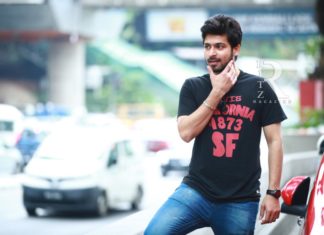Hemamalini Maiya, the petite lady at the helm of the brand MTR
This petite woman is at the helm of an iconic 92-year old brand which every Bangalorean would have experienced at some point in life. Before she contemplates taking that brand to more cities in India and overseas, she first needs to clear a few roadblocks in her entrepreneurial pathway. Hemamalini Maiya, Managing Partner, Mavalli Tiffin Rooms (MTR), tells RITZ about her journey at the landmark restaurant started by her grandfathers, which is today laden with as many challenges, as the opportunities that exist.
Hema coaxes everyone around her to try the crisp masala dosa, the melt-in-mouth kesari bhath and the spongy rava idlis that MTR has been churning out for decades. “If you don’t want to eat, you must at least have our filter coffee,” she says pointing to a cup of the steaming frothy brew made from coffee beans that are freshly roasted and ground each day.
“We recently introduced ragi dosa, rava dosa and podi dosa. The podi dosa was in fact invented in our Singapore outlet and then introduced in Bengaluru.” Singapore marks a paradigm shift in the mental makeup of a restaurant which for 80 years operated through its one landmark outlet near Lalbagh in Bengaluru.
Hema’s father Harishchandra Maiya, who ran the restaurant steadfastly after taking over from his uncle and one of MTR’s founders Yagnanarayana Maiya was “anti-expansion.’’ “Dad was not ambitious and he wasn’t sure if his children would be interested in running the place after him. He had great offers to expand, but he rejected all of them.”
After stepping into MTR post her father’s death in 1999, Hema knew that expansion was the key. Bengaluru was evolving and expanding at a rapid pace, and like the city, MTR had to expand, in order to sustain and thrive. “But I took time to expand,” she reveals, pointing out that the second MTR opened only in 2004, at a nondescript place in Rajajinagar that was originally meant for a saree store. Though that outlet closed two years ago, the experience was highly rewarding. “We realised that in a different place, the water and air is different and that affects the taste of the food. It was a great learning experience but we decided to close down due to the challenges.”
Hema has been instrumental in opening 8 more MRT outlets across Bangalore, and one in Udupi. The brand was taken abroad courtesy a family friend who lent support and felt MTR had huge potential in places with a strong Indian community. Singapore happened in 2014, followed by Dubai and then Muscat in 2016.
Unlike the outlets in Bengaluru and Udupi that are wholly owned and operated by Hema and her brothers Vikram and Arvind, the ones abroad are run via franchisees.
But running multiple outlets in a market fraught with risks is certainly a Herculean task.
Walking On A Tightrope
Restaurants are price-sensitive. Despite prices of raw materials hitting the rooftop, even an increase by 5 rupees in the menu can create a bunch of disgruntled customers. “Margins are low, around 10%. It’s a volatile market,” says Hema.
Another challenge pertains to the cooks. MTR has traditionally taken newcomers with a keen interest in food, and then trained them to become cooks. Finding such youngsters nowadays is tough. And the ‘cook’ saga has slowed down MTR’s expansion plans. As have visa issues (for expansion overseas). To ensure authenticity and traditional flavours of the food are retained, the company stations at least two experienced cooks from Karnataka to overseas locations. The launch of MTR London has been postponed thanks to issues related to immigration.
Thirdly, the changing socio-cultural dynamics of Bengaluru also have a role to play. The city today has people from all over calling it home, many who might not necessarily know of MTR and its legacy. To have a rava idli or a dosa, a newcomer might walk into any darshini that dots his lane, many that even serve Chinese and North Indian specialities with equal aplomb. Isn’t the market highly competitive? “Competition has always been there,” says Hema.
Even from Maiyas? Foodies say dishes at Maiyas, the restaurant brand started by her uncle Sadananda Maiya mirror MTR’s staples in taste. Quiz her and she says the food at the two brands might be a bit similar, but the experience is different. She is firm that unlike counterparts, MTR will never venture into North Indian and other cuisines. “Our forte is food from Karnataka and South Canara and we will stick to that. If it works, it works.”
But there must be something that MTR is working on to appeal more to newcomers, isn’t it? Especially since they opened in newer parts of Bengaluru like Whitefield and Kanakapura Road?
“Our Lalbagh restaurant is the main connect. We have storyboards in the new restaurants that chronicle our journey from 1924 to present, giving a fair idea of our heritage. We also give hand-outs, but it’s mainly word-of-mouth that has worked with us.” However in Singapore and the Gulf, there have been attempts at promoting MTR in expat clubs and by sponsoring events involving the Indian diaspora. But none of the newer restaurants can beat the footfalls and aura associated with the Lalbagh outlet, says Hema, which witness over 2,500 people walking in on any weekday and over double that number during weekends.
A Toughie
Irrespective of the challenges, the chirpy lady remains unfazed. She has encountered a lot since taking over the venture 17 years ago as a 28 year old. Being the first woman from her family to get involved with MTR in any capacity, she had to prove herself again and again. “Everyone had zero expectations from me when I took over after dad passed away. He did guide me earlier and had told me to try and sustain it,” says this engineer, recalling the time when she first walked into MTR and was followed by hawk eyed employees and old-time customers. “Handling old-timers was a daunting task as they had seen me as a baby and were now seeing me in an entirely different role.” She had to fix everything from the finances, human resources, to the kitchen and deal with inflated egos, union issues and restaurant politics.
“I learnt to be firm and gradually people realised that I am here to stay. I have received a lot of advice and guidance from well-wishers and also from my uncle Sadananda Maiya,” she says fondly.
Today, Arvind handles labour issues, while her other brother Vikram handles operations. Apart from shepherding the venture, Hema is closely involved with finance and accounts at MTR. “If not a restaurateur, I would have been a fitness trainer as my passion for food goes hand-in-hand with my love for gymming,”says Hema.
The Future
The lady is optimistic on the opportunities that exist and her plans ahead. India as a market for the restaurant business is thriving. The food services industry in the country is slated to reach $78 billion by 2018, say estimates by Technopak and the National Restaurant Association of India (NRAI).
Hema wants to take MTR to New Delhi and Mumbai, “but we first need to source our cooks,” she says. Internationally, she feels the Middle East (Qatar and UAE) and South East Asia (Thailand, Malaysia, Philippines) appear attractive for opening restaurants. Even Europe is great, yet to be tapped as far as South Indian food goes, says Hema. MTR could look at all these geographies in the near future, as well as destinations such as Australia and the USA. “We will expand at a steady pace once we overcome hurdles pertaining to cooks and visas. We are keen on all these countries.”
She is also open towards a ‘fine dine format’, and for positioning the bakeries that exist within the restaurants as standalone outlets. But patrons and foodies won’t see MTR at airports or malls due to the high rentals and operational hassles. “Though we have a restaurant at the Forum Value Mall in Bengaluru, a mall is not really viable for our kind of business. Hence we will stick with standalone restaurants,” says Hema.









 Raashii Khanna
Raashii Khanna










